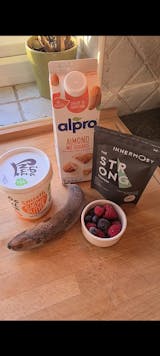Everyone wants to look as though they're glowing from within, and Innermost can help you to achieve that. If you're looking for tips on how to make your skin glow, you're in the right place. Here at Innermost we've just debuted our new skincare booster (The Glow Booster), which is packed with natural, research-backed ingredients to help you get your glow on.
Aside from taking The Glow Booster, though, taking care of your skin is all about balancing a variety of habits, ranging from sleeping patterns, gym routines, makeup and skin care treatments. Here are seven tried and tested ways to achieve dewy, supermodel skin.
So, wondering how to make your skin glow? Here's our top tips.
How to get glowing skin
- Tip one: stay hydrated
Skin cells are made up of water and this need to be replenished in order to stay hydrated. Experts recommend drinking at least 10 glasses of water every day as one of the best ways to keep your skin feeling hydrated and clear.
- Tip two: make sure you're getting your antioxidants
Eating foods full of antioxidants can help to protect your skin from sun damage and ease the pain and severity of breakouts. The Detox Booster is our vegan supergreen powder which is packed with nature’s most powerfully cleansing superfoods and antioxidants. Add one teaspoon to hot water or almond milk daily to give your skin some love, and you'll be rewarded with fabulous results.
- Tip three: Don't forget to exfoliate
Exfoliation is one of the best ways to clear your skin quickly. Using a light scrub or chemical exfoliant on your face two to three times a week will rid your skin of dead cells, dirt or sweat that might clogged your pores and lead to breakouts. It also improves your complexion, adds a glow and can even reduce the appearance of pores over time, thus reducing your chances of breakouts. Be careful not to overdo it - use products that match your skin type, so as not to aggravate the skin, and be gentle while you're scrubbing.
- Tip four: wash, wash, wash
Never go to sleep without removing all of the makeup, dirt and sweat from the day off your face. Cleansing your skin thoroughly with a cleanser, and following up with a toner and moisturiser can ensure your skin is properly cleansed before bed, and help reduce acne and blemishes.
-
Tip five: get those all-important eight hours
Getting enough sleep can greatly impact the appearance of your skin, as our bodies use this recovery time in order to repair and regenerate. When we are sleep deprived, our bodies create more cortisol, which can lead to increased inflammation in the body and breakouts in the skin.
- Tip six: just chill!
High levels of stress can compromise your skin. Engaging in calming activities such as yoga, meditation or exercise can help to relieve stress levels and prevent unnecessary stress breakouts. Just make sure you cleanse that face post-sweat.
- Get some good old fashioned sun (if you can)
One of the best things you can do for blemish control is to get around 10-15 minutes of direct sun on your face three times a week.
Natural sunlight can help to kill bacteria and promote natural oil production. Just be sure not to overdo it, as excessive sun exposure without protection can result in sun damage or dry skin and ain’t nobody got time for that. Buy a moisturiser with a decent SPF to make sure you're properly protected.























